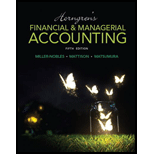
Available-for-sale investments:
Available-for-sale investments are the investments in debt or equity securities, where the investor wishes to holds less than 20% of voting stock, and neither referred as trading or hold-to-maturity investments. For debt securities, the investor do not wish to hold it till maturity, and hence reported either as current assets or as long-term assets in the
Fair value:
Fair value refers to the price of the securities in the market, if the company has decided to sell the securities.
Unrealized-gain or Unrealized-loss:
Unrealized-holding gain or loss occurs when the investor company record the investments at its fair value, in its financial statements, without disposing (selling) them. When the cost of the investment is lesser than the fair value of the investment, then it is unrealized-gain. On the contrary, when the cost of the investment is greater than the fair value of the investment, then it is unrealized-loss.
Where the unrealized holding gain or loss on the available-for-sale investment is reported on the financial statements.
Want to see the full answer?
Check out a sample textbook solution
Chapter 10 Solutions
Horngren's Financial & Managerial Accounting (5th Edition)
 Cornerstones of Financial AccountingAccountingISBN:9781337690881Author:Jay Rich, Jeff JonesPublisher:Cengage Learning
Cornerstones of Financial AccountingAccountingISBN:9781337690881Author:Jay Rich, Jeff JonesPublisher:Cengage Learning EBK CONTEMPORARY FINANCIAL MANAGEMENTFinanceISBN:9781337514835Author:MOYERPublisher:CENGAGE LEARNING - CONSIGNMENT
EBK CONTEMPORARY FINANCIAL MANAGEMENTFinanceISBN:9781337514835Author:MOYERPublisher:CENGAGE LEARNING - CONSIGNMENT Intermediate Accounting: Reporting And AnalysisAccountingISBN:9781337788281Author:James M. Wahlen, Jefferson P. Jones, Donald PagachPublisher:Cengage Learning
Intermediate Accounting: Reporting And AnalysisAccountingISBN:9781337788281Author:James M. Wahlen, Jefferson P. Jones, Donald PagachPublisher:Cengage Learning College Accounting, Chapters 1-27AccountingISBN:9781337794756Author:HEINTZ, James A.Publisher:Cengage Learning,
College Accounting, Chapters 1-27AccountingISBN:9781337794756Author:HEINTZ, James A.Publisher:Cengage Learning,





